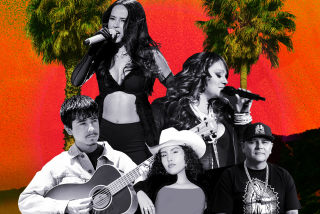Poet Group Meets, Preserves Heritage : Verse: They explore the roots of Chicano culture and history, and perform for students.
- Share via
Javier Cortez vividly remembers how he fell in love with poetry the first time he heard someone recite verse at a local coffeehouse one night in October.
After that encounter, he said he wanted to dedicate his life to poetry.
“My friends and I decided to form a poetry group” because of the experience, said Cortez, 26. “We didn’t know how to do it but a (Fullerton College) professor helped us.”
Less than a year after forming, the group grew from four students to more than 35 members. They call themselves the Chicano Poet Society.
Most of their performances, which include sonnets, songs and free verse, are given in front of high school and college audiences and also in coffeehouse settings such as the Tlaquepaque restaurant in Placentia.
The Society is a loose-knit, nonprofit organization that meets for the educational enhancement of Chicanos through poetry readings.
“We ask for donations but the most we have ever received is $156,” said Carlos De Rosas, the treasurer. “We use the money to help students with tuition.”
The Chicano Poet Society includes former gang members, students from Fullerton College and Cal State Fullerton, a teacher, construction workers and a handful of restaurant employees. They practice wherever they can--in garages, homes and sometimes outside with Mother Nature.
Jimmy Alvarez, 25, who works in a restaurant in Anaheim, said he loves to read his poetry in front of others and doesn’t mind the critique session that follows. The Mexico City native said he feels good when he writes about Chicano culture in his poems.
“I love my culture,” said Alvarez, who writes all of his poems in Spanish. “Most of my poems are about Mexico . . . my homeland.”
Because of their different backgrounds, poems are recited in English, Spanish, Chicano slang, called calo , and Nahuatl, an ancient Aztec language.
Very few people speak or understand Nahuatl in the United States but it is still spoken in many parts of central Mexico.
One person who speaks Nahuatl is David Hernandez Vazquez, 38, who works for a church in Santa Ana and is a member of the society. He is a native Nahuatl speaker originally from Puebla, Mexico, and moved to the United States to teach Nahuatl to Latinos and anyone else who wants to learn.
“There are still thousands who speak and understand Nahuatl in Mexico,” said Vazquez, who gives lessons informally in his community. “But very few in the world can write it. I don’t want it to die. The Aztecs and their language are one of the most important cultures in the world.”
When Vazquez recites one of his poems in Nahuatl, he translates it into Spanish, someone else translates into English, so everyone understands the meaning of his composition.
An excerpt from a Nahuatl poem called the Birth of Tenochtitlan (the former capital of the Aztec empire):
Telpocatl namachtiani Xictali mo may Tech mo may Uan xi cnotza tenochtitlan
Which, translated, means: Young student, Put your hand In your heart, And call tenochtitlan Vazquez is considered an important member of the group because he represents the roots of Chicano culture and history, Cortez said. His knowledge of the ancient language is admired and valued because he is preserving something that has vanished among modern day Latinos, Cortez said.
Jannet Ramirez, 21, joined the Chicano Poet Society after watching a performance at a local coffeehouse in Placentia. She was already working for performing groups in Santa Ana and was curious about using poetry to help young Chicanas find their roots through poetry.
“Usually we work with young homeboys and homegirls,” said Ramirez, a Rancho Santiago student who also plays on the college’s volleyball team. “Sometimes they are a tough audience because they try to act tough and keep their feelings inside.”
Others in the group write about issues such as drugs, dropping out of school, gang shootings, neighborhood empowerment, women’s rights, education and bilingual education.
Said De Rosas: “Poetry is the highest form of language known to man.”
Felipe Alvarado, 24, agreed. He said he likes to use poetry in Spanish to describe love and passion. “Spanish is my language and there is no better language to express romance,” he said. “And poetry is even better.”
More to Read
Sign up for Essential California
The most important California stories and recommendations in your inbox every morning.
You may occasionally receive promotional content from the Los Angeles Times.













